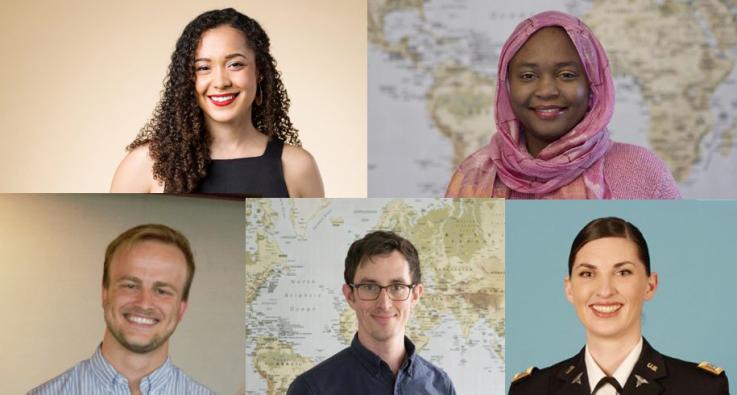Preventing mother-to-child HIV transmission, conducting novel research on West Nile Virus, and developing better approaches to mental health are just some of the ways that UW global health students are already making positive health impacts locally, nationally and globally. Each year, the Department of Global Health recognizes graduating Master’s, PhD and medical student scholars who are exemplary students and engaged leaders in global health.
This year’s awardees included Rabi Yunusa, who received the Global Health Outstanding Master’s Student award.
Yunusa is a medical doctor from Nigeria. Her thesis work focused on the barriers that prevent women from getting proper service in regard to mother-to-child HIV transmission. Yunusa is perpetually working to improve the health of Nigerian women, children, and adolescents.

“Winning this award was a surprise,” Yunusa said. “I feel that during my time at UW I was able to embrace the spirit of why I’m here and able to stay true to my own mission, so things came naturally.”
While at UW, Yunusa was a recipient of the Endowed Fellowship for Global Health Excellence, Equity and Impact from the Department of Global Health, and worked as a teaching assistant for global health and public health classes, as well as two quarters as a DGH research assistant.
Christopher Kemp was the PhD recipient of the School of Public Health Gilbert S. Omenn Award for Academic Excellence. Kemp is graduating from the PhD in Global Health: Metrics & Implementation Science program.
Kemp’s award recognizes his work in implementation science in the mental health and HIV-prevention fields, with a focus on the United States and South Africa, where he was a Peace Corps volunteer. Kemp’s research was conducted in collaboration with the Southern African Research Consortium for Mental Health Integration.

“We’ve been able to do a huge range of work that has substantive longitudinal impact in South Africa and vulnerable populations in the U.S.,” Kemp said. “I’m really proud of the work we’ve done in collaboration with our South African colleagues. We’ve gone from a grant that we secured five years ago to excellent long-term implementation research and improvements in the delivery of this integrated care model.”
The Global Health Outstanding PhD Student, Kathryn McGuckin Wuertz, is graduating from the Pathobiology program. She was supported by a fellowship from the U.S. Army Medical Service Corps and gained a unique perspective on global health while deployed in Afghanistan. Wuertz’s research focused on flaviviruses, during which she identified a novel role of an immune protein that defends against West Nile Virus.

MPH student Courtney Jackson was also recognized for making University of Washington’s Husky 100 list, the university’s top award for students displaying exemplary work in their respective fields. During her time at UW, Jackson has focused her work on issues at the intersection of homelessness, substance use, and criminal justice.

“My greatest passion in global health is developing capacities in-country so that eventually the presence of foreign practitioners is no longer necessary,” said Jackson. “I also want to see the development of equitable trade policies and mechanisms of foreign aid that allow for agency, power-sharing, and paths out of poverty. And thirdly, I want to see the dismantling of global anti-blackness and the creation of systems of belonging that are co-created alongside people of color.”
Fritz Siegert, a medical student graduating from the Global Health Pathway, was honored with both the Global Health Outstanding Medical Student Achievement Award and the 2019 US Public Health Service Award. The national award is given to medical students who are public health champions advancing the U.S. Public Health Service mission to “protect, promote, and advance the health and safety of our Nation”, and who are helping address public health issues.
Siegert traveled to Uganda with the help of the Fogarty Global Health Training Program, and also did public health work in Moscow, Idaho relating to proper tobacco cessation practices. Still, Siegert says the work he performed through a UW Global Health Resource Center initiative stands out.

“Of all the initiatives I’ve worked on, my Global Health Immersion Program (GHIP) experience was pretty unique. It was my first true global health experience,” Siegert said. “Working alongside these super dedicated women in Kenya, who without getting paid were committed to improving the health of their community, was inspiring. They’re still using some of those outreach materials and hygiene materials that we all helped put together, too. That’s something I’ll think about for a long time.”
